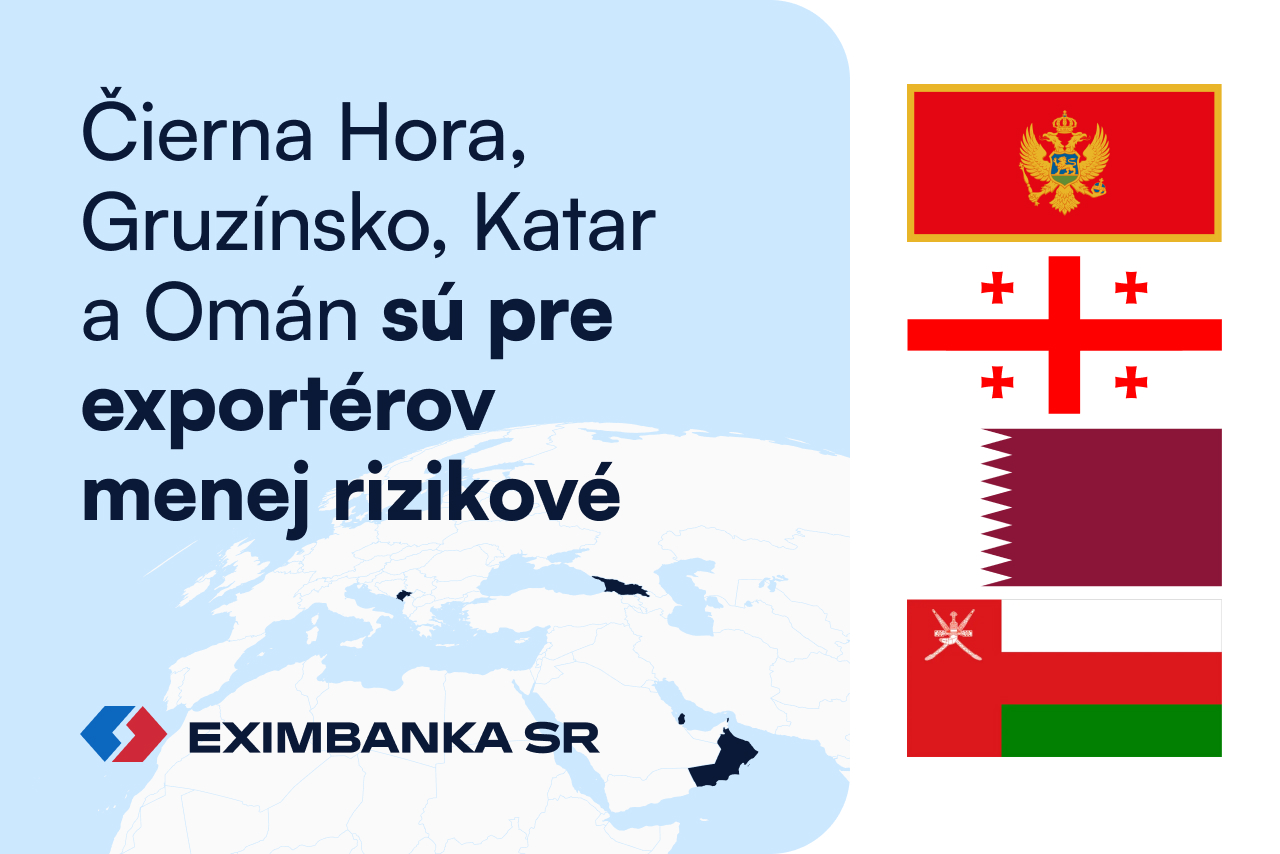At its February meeting, the OECD Consensus member countries decided on a new classification of four countries. Montenegro, Georgia, Oman and Qatar all improved by one level in the country risk ranking. Montenegro and Georgia have been helped by pro-Western orientation, Qatar and Oman by gas and oil production. For the export credit agencies, these countries have been so since 9. February 2024 represent a lower level of risk.
“Positive adjustment of the riskiness of these countries for Slovak exporters means that they will be able, in selected cases, to take advantage of more favourable conditions for the provision of insurance products. In this context, Eximbanka can mitigate commercial, political and/ or. combined risks of default by foreign debtors,” said Pavol Tavač, Deputy CEO of Eximbanka.
Montenegro (upgrade from category 7 to category 6)
Montenegro is a candidate country for membership of the European Union, with the aim of becoming a member by 2025. The country adopted the euro as its currency in 2002, but is not a member of the euro area. Despite some instability on the domestic political front, the euro is helping the Montenegrin economy to achieve macroeconomic and financial stability and facilitating trade. In 2020, Montenegro joined the six Balkan countries’ regional Common Market, which aims to remove trade barriers and coordinate investment policies. The country is attractive for foreign direct investment and has potential in tourism.
Georgia (upgrading from category 6 to category 5)
Georgia’s economy is driven by exports and FDI inflows, and supported by rising tourism and transport revenues. The war in Ukraine has significantly increased Georgia’s role as a key transit country for transport between Europe and Asia. Despite the ongoing war, a steady trend in improving macroeconomic metrics is expected. The Government of Georgia continues to budget conservatively, using one-off funds for strategic investments that will strengthen economic assets and the workforce.
Oman (upgrading from category 5 to category 4)
Oman’s economic recovery is gaining momentum, mainly due to hydrocarbon production. Fiscal and external buffers have increased, supported by higher hydrocarbon revenues and significant fiscal adjustments under the medium-term fiscal plan. The government remains committed to fiscal consolidation, notwithstanding the oil windfall, as well as reforms to strengthen public financial management and transparency.
Qatar (upgrade from category 3 to category 2)
Qatar has large net foreign assets and one of the highest GDP per capita ratios. It has a flexible public finance structure. The high level of government indebtedness is assessed negatively compared to similarly ranked countries whose economies are equally dependent on hydrocarbon production. The country is running sustained fiscal surpluses and favourable conditions provide an opportunity to embark on a growth-enhancing consolidation over the medium term, including in particular revenue diversification and the introduction of a value-added tax. The government has committed to strengthen the medium-term fiscal framework, to be more transparent and to accelerate structural reforms.
For an overview of the world’s countries by OECD risk rating, see our new website.
Keep up to date with export and foreign trade information on our Linkedin profile.
ABOUT EXIMBANKA SR
As the only direct instrument of the state for export financing, EXIMBANKA SR is an important part of the chain responsible for promoting the country’s economic policy in the field of external economic relations. It is an important instrument of state support for exports in the field of financing, provision of guarantees and insurance of credit risks. It offers a wide range of export-related financial products, especially credit insurance, financing and guarantees. As a state export credit agency, it enables Slovak exporters to enter into trade and investment relations where the commercial financial sector is less interested in taking on risk and therefore performs a complementary function.
Media contact: Martina Vráblik Solčányiová
spokeswoman
EXIMBANKA SR
Department of Communication and Marketing
Tel: +421 903 542 072 vrablik@eximbanka.sk
